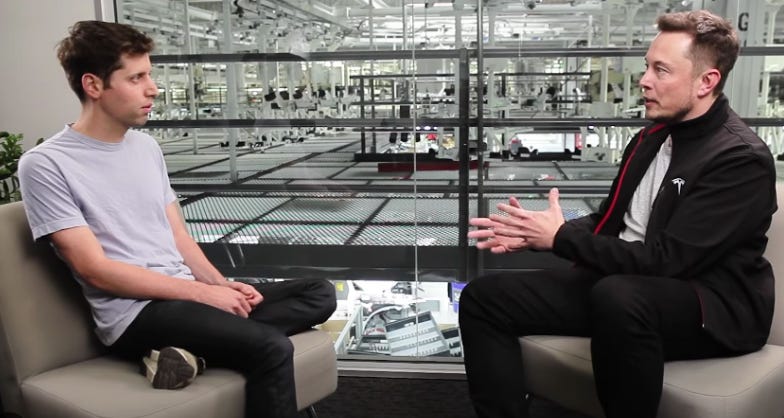Hey Guys,
This week I was a bit surprised when we got a glimpse of how Sam Altman sees the future of his A.I. lab startup. OpenAI, the organization behind the buzzy artificial intelligence bots ChatGPT and DALL-E, projects that it will be able to generate $1 billion in revenue by 2024, Reuters reports.
The Venture Capital types see A.I. as very profitable it turns out. OpenAI is in negotiations with Microsoft for more funding. The exclusive access for $1 Billion deal in July, 2019 is getting a bit old.
This is because OpenAI actually thinks its now worth around $20 Billion. That’s right. How does it make sense? Citing sources briefed on OpenAI’s recent pitch to investors, Reuters said the San Francisco-based organization expects $200 million in revenue in 2023 and $1 billion by 2024. OpenAI makes money by charging developers to license its technology to generate text and images.
So as you know, last month, OpenAI unveiled ChatGPT to the public. The chatbot, which can perform search queries and write entire essays based on prompts, immediately garnered attention in the tech and media worlds — not least from writers worried it’s so good, it could soon replace us.
Certainly davinci-003 and upgrades to GPT-4’s RLHF looks promising. OpenAI by launching the demo in 2022 really beat Google to it with their own LaMDA that is expected to come out in 2023 with some sort of a product demo launch as well.
Artificial intelligence as a whole is one of the most heavily funded startup sectors. Funding to AI startups in recent years has accounted for as much as 10% of all global venture capital dollars invested, Crunchbase data shows. Last year, nearly $70 billion in venture capital went to AI startups worldwide.
According to WSJ, OpenAI uses a huge amount of compute power to run its AI products on Microsoft Azure. Funds from any new investment could be used to help offset those costs. But will OpenAI really be as profitable as it expects? That is a matter for debate.
It’s $20 Billion internal valuation doesn’t make much sense, at least compared to others in the space. Along with OpenAI, the most highly valued startups in the space include data and AI company Databricks (valued at $38 billion), driverless auto company Cruise ($30 billion), and AI writing assistant service Grammarly ($13 billion). Of these, only Databricks make any tangible sense. Waymo, Cruise and Baidu have struggled to scale their robo-taxi revolution.
It’s not as if OpenAI’s talent and first-mover advantage is that significant. Sure they want Microsoft to get acquired so Sam Altman can have a big payout, I get that.
Sam walks around Silicon Valley with “SBF like bravado”:
And why wouldn’t he, he’s as close to a PayPal Mafia heir as they get.
But let’s think about who stands the most to gain from OpenAI’s absurdly high valuation? OpenAI alone has raised more than $1 billion in venture funding, according to Crunchbase data, with Microsoft as its largest investor. Khosla Ventures, Sequoia Capital, Tiger Global, Y Combinator and Bedrock Capital have also provided capital.
Y Combinator, you mean the same one Sam Altman himself has been involved with since 2011? What a shocker.
Valuation Based on Seconded Shares
The organization was recently valued at $20 billion in a secondary sale of its shares, Reuters reported. Its supporters see potential for its technology to generate huge amounts of revenue by automating even creative tasks like writing and design.
But do they understand how competitive the GEnerative A.I. era is going to be? Do they understand how many other companies and A.I. labs and startups are working on foundational models and RLHF as well with GPT-3 like technologies?
Microsoft also provides OpenAI with computing power. The software giant has reportedly considered (theregister) increasing its stake in OpenAI, believing that its artificial intelligence technology could generate business for Microsoft’s cloud business as more companies embrace AI and automation.
Since ChatGPT has been celebrated online, and especially on LinkedIn and Twitter, both of whom have ties to OpenAI via previous funding or co-founder conflict of interest in the case of Elon Musk, it’s all rather suspicious and raises red flags. Just don’t tell the Silicon Valley and VC mafia. They are loving this A.I. hype once again.
“We’re going to see advances in 2023 that people two years ago would have expected in 2033,” Microsoft President Brad Smith told Reuters in an interview. “It’s going to be extremely important not just for Microsoft’s future, but for everyone’s future.”
But is the era of Monopoly capitalism and winner-takes-all capitalism good for the future of artificial intelligence? When OpenAI is already so far from its founding values of democratizing A.I. while being so secretive, it’s hard to fathom. Of all the Generative A.I. startups, OpenAI is probably the least “open”. This probably means it wants to be acquired by a huge sum as an unfair advantage for Microsoft.
Do I have to be the one to point this out? Is OpenAI really an A.I. for good company? Building “beneficial AGI” OpenAI said in their PR, hilarious. And seriously concerning.
Thanks for reading!




